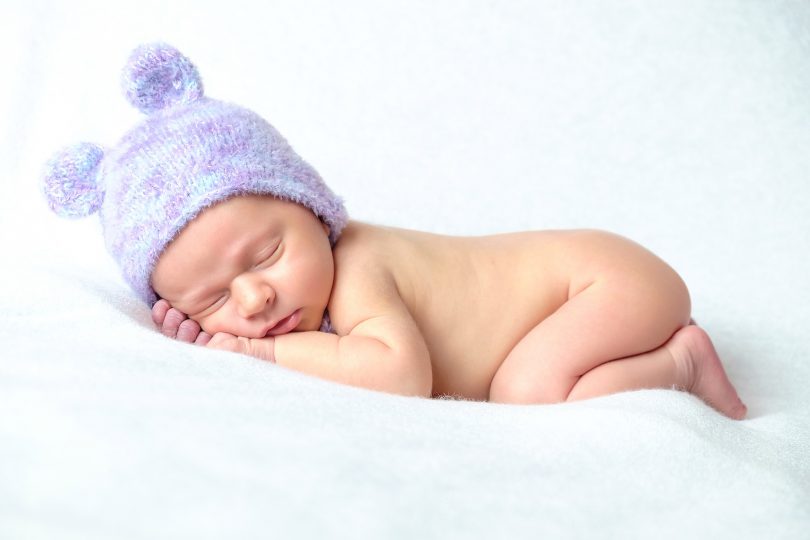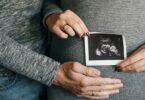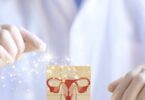For many women and couples, oocyte donation presents as an important option on their fertility journeys.
The procedure is considered when the future mother does not have follicles suitable for IVF / ICSI. This may be due to mature age. Certain disorders or genetic problems may also prompt your doctor to suggest it to you.
Oocyte donation at a glance
For oocyte donation, oocytes from a donor (retrieved by oocyte puncture) are fertilized in the lab with semen of the father-to-be the (IVF / ICSI). The practical implication is that the future father’s presence at the fertility clinic is required on the date of oocyte puncture. If this is not possible, cryo-conserved semen presents as an alternative. Usually you can expect first information on the number of oocytes retrieved and fertilized on the day after puncture. The fertilized oocytes will remain in the lab for some days and are then either inserted into the future mother’s womb (emryo transfer) or cryo-conserved.
For the procedure to succeed, both women‘s cycles (the donor’s and the recipient’s) need to be synchronized precisely. To achieve this, it is mandatory that the recipient follows the recommendations of the fertility clinic as precisely as possible.
After transfer, the recipient will have to take progesterone throughout the second half of her menstrual cycle to allow for the embryo to implant into the womb. A pregnancy test will tell you app 12 – 14 days later whether the treatment has been successful.
What to consider?
In addition to medical aspects, you may want to contemplate ethical, religious, financial and organisational issues as well before you decide for or against this method of fertility treatment. Get well informed by getting in touch with specialized organisations such as FertiTravel to gather relevant information on practical issues. Talking to other couples affected can also provide important insights.
Many couples also choose to consider as to when and how their future child should learn about its special history. Experience shows: every person wants to learn about their origin. Even though children from oocyte donation are truly longed for, they will still wonder about their biological mother. Experts recommend to address the issue rather early to avoid problems in your parent-child relationship.
Optimizing success of oocyte donation
Once you have made up your mind, you yourself can contribute to a successful outcome. A healthy pregnancy is influenced by various factors, your lifestyle and nutrition being one of them. All recommendations aim to provide your future baby with the best conditions for its development. Good to know: Everything you can do, happens BEFORE embryo transfer. Once the embryo is inside your womb, implantation cannot be forced. However, it should not be disrupted either, which is why you should refrain from lifting heavy weights or participating in high-risk sports.
By the way: Just like lifestyle and nutrition of the mother-to-be, health and sperm quality of the future father are vital for your fertility treatment as well. Generally speaking, experts recommend that both partners be increasingly aware of a healthy lifestyle and nutrition at least 3 months prior to your treatment.
This is what you can do from 3 months prior to your treatment:
Healthy weight
Being under- or overweight or having micronutrient deficiencies can impair your fertility and healthy pregnancy. Therefore it is recommended to stick to a healthy weight. Importantly, major weight loss shortly before you start a fertility treatment is not advised either. Studies show that long-term weight matters more than the present situation itself.
Caffeine
Caffeine from coffee, tea or energy drinks should be consumed in moderate quantities only.
Medication
Certain medication may interfere with your fertility treatment. Please inform your doctor about every medication you take. Do not forget herbals or supplements either.
Smoking
Smoking has been shown to reduce success rates of fertility treatment. In addition to that, it can harm your pregnancy and your baby. Men’s fecundity suffers from the toxins in tobacco as well, with smokers having significantly less spermatozoa and diminished semen quality. Therefore it is vital that both of you quit smoking the sooner the better.
Folic acid
Just like every other woman planning for pregnancy, you ought to make sure your body is well supplied with folic acid. At least 400 µg are recommended, even better are 800 µg. If you suffer from Hashimoto, endometriosis or PCOS, I recommend a folic acid containing product tailored to meet your specific dietary requirements ( e.g. Fertilovit®).
Endometrium
Not surprisingly, your baby’s future home for the next months, the inner lining of your womb (endometrium) plays a vital role for successful implantation. Ideally, it consists of two layers (visible as 3 lines in ultrasound) and is >7 mm high.
In addition to taking your medication as prescribed by your fertility doctor, there are a few other things you can do to support endometrial health.
Nutrition
A study from 2016 shows that your diet is important. Endometrial health and subsequently pregnancy rates were improved when women stuck to a diet rich in wholegrains (app 30g wholegrain per day) (Gaskins et al, 2016).
Perfusion
Another factor supporting embryo implantation is good endometrial perfusion. Make sure you stay well hydrated by drinking at least 2 l per day. Prefer water and unsweetened teas, and stay clear of sodas with a high sugar-content.
Vitamin D
Virtually every day, research seems to find new important roles for vitamin D, and this holds true for endometrial health as well (Lerchbaum 2014). New research suggests that vitamin D is involved in maintaining a healthy environment inside your womb (Salamonsen LA et al., 2016; Cui et al., 2017) .
Given that – especially during dark winter weeks – many women lack the recommended levels of vitamin D, it is a good idea to have your vitamin D levels checked prior to starting your fertility treatment.
Effects of other micronutrients, too, have been examined.
Vitamin E
According to a study from 2012, supplementing vitamin E results in improved endometrium during fertility treatment (Cicek et al, 2012).
B-vitamins
Other studies show that B-vitamins seem to be important for healthy fertility as well. Higher levels of vitamin B12 werde associated with increased life birth rates after IVF (Gaskins et al, 2015) and appropriate niacin-supply (vitamin B3) is considered important since Shi et al pointed out it role in healthy fertility and reproduction in 2017. It is in particular women with a high BMI, diabetes or increased inflammatory levels that have been found at risk of having too low levels (Baker et al, 2002). Another B-vitamin, B6, seems to be crucial largely due to its importance for healthy blood perfusion. Together with vitamins B12 and folic acid it is required for homocysteine metabolism, making sure not too much of this unhealthy metabolite can accumulate in the body.
Vitamin C
Vitamin C is the best-known water-soluble antioxidant. A recent review article from 2017 authored by the renowned Cochrane Institutes concluded that a good supply with antioxidants is beneficial for subfertile women (Showell et al, 2017)
What about him?
Strengthen your sperms with zinc, selenium and precious antioxidants. However, make sure not to overdose, as sperms a rather sensitive cells and do not like overdosage. To be on the safe side, choose a product that has been designed specifically for support of sperm health.
Take home message
In summary, a healthy lifestyle and nutrition is recommendable prior to oocyte donation. Drinking enough, choosing whole grain options, and supplementing folic acid in combination with at least the vitamins B, C, D, and E is well worth a try, especially because overdosages are hardly to be expected. For the future father additional zinc, selenium, and precious antioxidants make for support of sperm health.
References:
Baker et al: Vitamin profile of 563 gravidas during trimesters of pregnancy. J Am Coll Nutr 2002; 21: 33-7
Cicek et al: Vitamin E effect on controlled ovarian stimulation of unexplained infertile women. J Assist Reprod Genet 2012; 29:325–328
Cui et al., Nutrition, microRNAs, and Human Health. Adv Nutr. 2017 Jan 17;8(1):105-112. doi: 10.3945/an.116.013839. Print 2017 Jan.
Gaskins et al: Association between serum folate and vitamin B-12 and outcomes of assisted reproductive technologies. Am J Clin Nutr. 2015 Oct; 102(4): 943–950
Gaskins: EARTH Study Team Maternal whole grain intake and outcomes of in vitro fertilization. Fertil Steril. 2016 Jun;105(6):1503-1510.
Lerchbaum and Rabe: Vitamin D and female fertility. Curr Opin Obstet Gynecol. 2014 Jun;26(3):145-50.
Liu W et al. MicroRNA and Embryo Implantation. Am J Reprod Immunol. 2016 Mar;75(3):263-71. doi: 10.1111/aji.12470. Epub 2015 Dec 28.
Quintanilha BJ et al. Nutrimiromics: Role of microRNAs and Nutrition in Modulating Inflammation and Chronic Diseases. Nutrients. 2017 Oct 27;9(11). pii: E1168. doi: 10.3390/nu9111168.
Salamonsen LA et al.The Microenvironment of Human Implantation: Determinant of Reproductive Success. Am J Reprod Immunol. 2016 Mar;75(3):218-25. doi: 10.1111/aji.12450. Epub 2015 Dec 12.
Shi et al. NAD Deficiency, Congenital Malformations, and Niacin Supplementation. 2017; N Engl J Med 2017;377:544-52 | Showell et al: Antioxidants for female subfertility. Cochrane Database Syst Rev. 2017 Jul 28;7
Yuval Y, Lipitz S, Dor J, Achiron R: The relationship between endometrial thickness, and blood flow and pregnancy rates in in-vitro fertilization. Hum Reprod. 2000; 14: 1067-1071,







